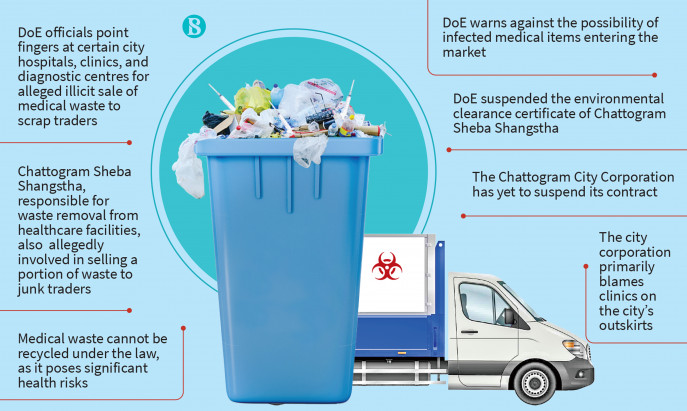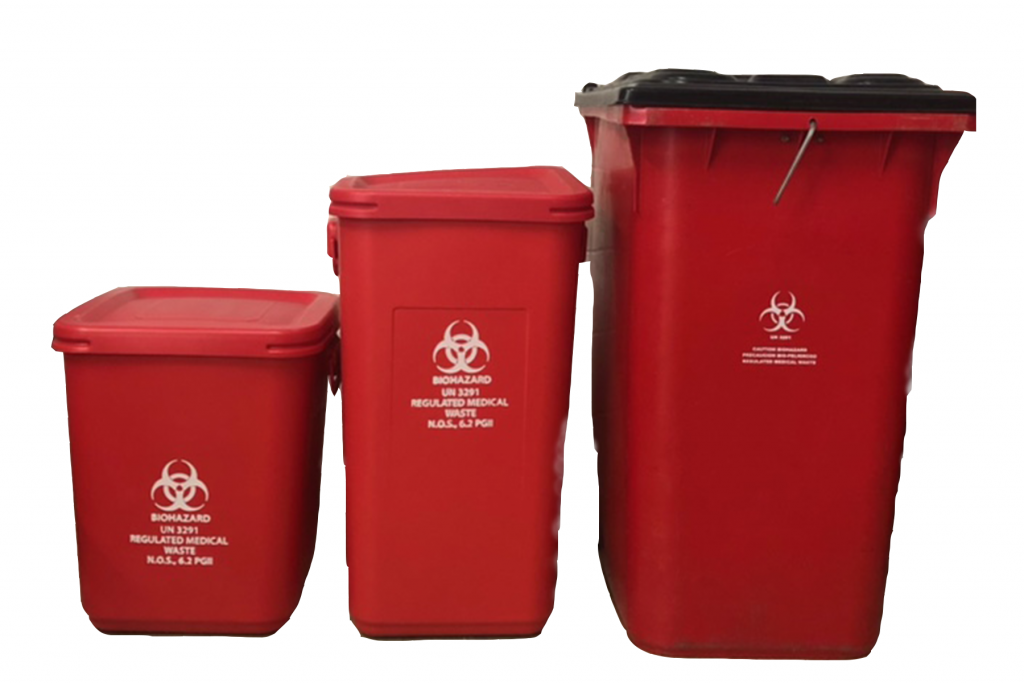Medical Waste Removal Quality: Elevating Safety And Security Requirements in Your Center
Medical Waste Removal Quality: Elevating Safety And Security Requirements in Your Center
Blog Article
The Importance of Appropriate Medical Garbage Disposal: A Guide for Health Care Facilities
Proper clinical garbage disposal is an important facet of health care facility monitoring, making certain the safety and security and well-being of individuals, team, and the setting. From understanding the different classifications of clinical waste to following regulatory demands, health care facilities should embrace efficient waste partition practices and choose proper disposal techniques. The value of appropriate clinical waste disposal goes beyond simple conformity; it is a responsibility that needs ongoing training and education for personnel. In this overview, we will check out the various elements of medical waste disposal and highlight the essential steps that healthcare facilities should take. By implementing these techniques, medical care centers can minimize dangers, shield public health, and add to a cleaner, safer environment.
Comprehending Clinical Waste Categories
Comprehending clinical waste categories is crucial for appropriate disposal in health care facilities. Medical waste is a broad term that includes different types of waste created in healthcare setups, such as research laboratories, medical facilities, and centers. Classifying clinical waste helps make certain that it is taken care of, saved, and disposed of safely and in conformity with applicable regulations.
There are numerous classifications of medical waste that medical care facilities require to be knowledgeable about. These classifications include contagious waste, sharps waste, pharmaceutical waste, chemical waste, and contaminated waste (medical waste disposal services with WasteX). Each category has certain features and needs various disposal approaches to minimize the danger of damage to medical care employees, patients, and the setting
Contagious waste, for instance, refers to lose polluted with potentially contagious materials, such as blood, body fluids, and cells. Drug waste is composed of expired or extra medications, while chemical waste consists of harmful chemicals utilized in medical procedures.
Conformity With Regulatory Needs
Health care centers need to guarantee compliance with governing requirements for correct medical garbage disposal. Governing bodies, such as the Epa (EPA) and the Occupational Security and Health And Wellness Administration (OSHA), have developed standards and policies to guard public health and wellness and the environment. These guidelines detail the proper handling, storage space, transportation, and disposal of medical waste.
Compliance with governing requirements is vital for healthcare centers to stay clear of legal charges, reputational damage, and possible injury to human wellness and the atmosphere. Failure to adhere to these laws can lead to penalties, lawsuits, and also the suspension or abrogation of operating licenses.
To ensure compliance, medical care facilities need to develop detailed waste management programs that consist of team training, appropriate waste partition, and making use of ideal containers and tags. Normal audits and evaluations need to likewise be conducted to determine any kind of non-compliance issues and resolve them quickly.
It is essential for health care facilities to keep up to date with adjustments in regulations and upgrade their waste administration techniques appropriately. This can be achieved by actively checking updates from governing bodies and getting involved in training programs and workshops.
Implementing Reliable Waste Segregation Practices
To make sure proper clinical waste disposal, health care facilities should implement reliable waste partition techniques. Waste partition is a crucial step in the overall waste monitoring process, as it helps lessen the threat of infection, stops cross-contamination, and makes sure the risk-free disposal of various kinds of waste. Reliable waste segregation methods entail separating medical waste right into various categories based upon its qualities and prospective threats.
One typical method is the segregation of sharps waste, such as scalpels and needles, from other kinds of clinical waste. Sharps waste should be placed in puncture-resistant containers to avoid injuries and prospective infections. In addition, contaminated materials, such as drugs and chemicals, ought to be divided from general medical waste to avoid ecological contamination.
Correct labeling and color-coding of waste containers are necessary for effective waste partition. Noticeable and clear labels should be put on each container to show the kind of waste it contains and any type of unique handling requirements - medical waste disposal services with WasteX. Furthermore, color-coding can be utilized to separate in between different waste categories, making it simpler for health care team to dispose and recognize of waste properly
Regular training and education for medical care personnel is important for the effective implementation of waste partition techniques. Team member ought to be educated on the different waste classifications, proper segregation strategies, and the importance of complying with waste monitoring procedures. This will certainly assist guarantee conformity and consistency in waste segregation techniques throughout the center.
Picking Appropriate Disposal Techniques
Proper choice of suitable disposal approaches is vital in ensuring the environmentally responsible and safe administration of medical waste in medical care centers. Health care centers generate a variety of clinical waste, consisting of sharps, transmittable waste, pharmaceutical waste, and chemical waste - medical waste removal. Each sort of waste calls for details disposal approaches to lessen the risk of contamination, medical waste disposal services with WasteX injury, and ecological injury
One common disposal technique for medical waste is incineration. Incineration entails the controlled burning of waste at high temperature levels.

Chemical sanitation is another approach utilized for particular sorts of medical waste, such as pharmaceutical waste. This method makes use of chemicals to reduce the effects of or destroy impurities. It is crucial to pick chemicals that are eco friendly and safe.
In some cases, land fill disposal might appropriate for non-hazardous medical waste (medical waste disposal services with WasteX). Appropriate segregation and product packaging are essential to avoid leak or contamination.
Inevitably, medical care centers must meticulously assess the characteristics of their clinical waste and select suitable disposal methods that focus on security, environmental management, and regulatory conformity. Routine training and surveillance are necessary to guarantee that healthcare staff adheres to proper disposal methods.

Training and Educating Team on Correct Disposal Procedures
Team education and training play a vital function in ensuring the appropriate disposal of medical waste in medical care facilities. It is important that all team members, consisting of doctors, nurses, specialists, and assistance team, receive thorough training on appropriate disposal treatments. This training ought to cover the various sorts of clinical waste, their potential hazards, and the suitable approaches for dealing with, segregating, and taking care of them.
One of the main goals of staff education and training is to make certain that all healthcare specialists comprehend the relevance of proper disposal procedures and the potential effects of improper waste administration. They require to be familiar with the threats related to medical waste, such as the transmission of infections and the contamination of the atmosphere. medical waste removal. By understanding these dangers, personnel participants will certainly be a lot more determined to adhere to correct disposal protocols and take the necessary precautions to safeguard themselves, their coworkers, and the neighborhood
Training should additionally cover making use of personal protective devices (PPE) and the appropriate methods for dealing with medical waste. Employee need to be educated on exactly how to identify and segregate various sorts of waste, such as sharps, infectious waste, and dangerous chemicals. They ought to also be educated on the appropriate use of waste containers, such as sharps containers and biohazard bags, as well as the importance of labeling and sealing these containers properly.
In addition, staff education and training should consist of routine updates and correspondence course to make sure that health care experts stay notified concerning the newest regulations and best techniques in medical garbage disposal. This ongoing education is vital to preserve a high level of recognition and conformity among team member.
Final Thought
In verdict, proper medical waste disposal is of utmost relevance for medical care facilities. Understanding the different groups of medical waste and complying with governing needs makes sure the security and health of both medical care workers and the basic public.
From recognizing the different categories of medical waste to conforming with regulatory requirements, health care centers should take on reliable waste segregation techniques look at this web-site and choose proper disposal methods. These groups include contagious waste, sharps waste, pharmaceutical waste, chemical waste, and contaminated waste.To guarantee appropriate medical waste disposal, health care centers must apply efficient waste partition practices. Waste segregation is an important action in the total waste management process, as it aids decrease the risk of infection, stops cross-contamination, and ensures the risk-free disposal of various kinds of waste. Medical care facilities produce a selection of clinical visit the website waste, consisting of sharps, transmittable waste, pharmaceutical waste, and chemical waste.
Report this page